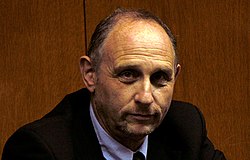This article needs additional citations for verification .(April 2012) |
| |||||
| Decades: | |||||
|---|---|---|---|---|---|
| See also: | |||||
The following events occurred in the year 2007 in Israel.
This article needs additional citations for verification .(April 2012) |
| |||||
| Decades: | |||||
|---|---|---|---|---|---|
| See also: | |||||
The following events occurred in the year 2007 in Israel.
The most prominent events related to the Israeli–Palestinian conflict which occurred during 2007 include:

Notable Palestinian militant operations against Israeli targets
The most prominent Palestinian militant acts and operations committed against Israeli targets during 2007 include:
Notable Israeli military operations against Palestinian militancy targets
| | This section needs expansion. You can help by adding to it. (October 2010) |
The most prominent Israeli military counter-terrorism operations (military campaigns and military operations) carried out against Palestinian militants during 2007 include:

